Once-Great, Now-Disgraced American Company Also Facing SEC Probe, Lawsuits, Upcoming 2008 Election Meltdowns
Not to Say We Told Ya So, Diebold Shareholders...
 The death spiral for the 131 year-old company, once respectfully known as Diebold, continues, as its stock price falls to a 5-year low today, near year's end (currently $29.23/share and still sinking, from a 52-week high of $54.50/share), along with the additional news that the U.S. Department of Justice has now joined the SEC in an investigation concerning the company's "Enron-like" bookkeeping tricks...
The death spiral for the 131 year-old company, once respectfully known as Diebold, continues, as its stock price falls to a 5-year low today, near year's end (currently $29.23/share and still sinking, from a 52-week high of $54.50/share), along with the additional news that the U.S. Department of Justice has now joined the SEC in an investigation concerning the company's "Enron-like" bookkeeping tricks...
The BRAD BLOG, of course, originally reported on the SEC's investigation into Diebold's book-keeping chicanery back in May of 2006, just a few months after our first exclusive report, based on information from a company insider we dubbed DIEB-THROAT, preceded a 20% stock-price plunge just days afterward.
At the time, back in late September 2005, the stock price plunged to a 52-week low of about $44.37/share (which we're sure they'd kill for now --- not that we wish to give them any ideas) and DIEB-THROAT told us in response to the related news: "the last time this kind of deception occurred it was called Enron."
Then came a class action securities fraud suit against the company in December 2005, as first broken by The BRAD BLOG natch, before the parallel SEC investigation first became public.
 Since then, following one independent study after another after another after another, finding their electronic voting systems to be virus-prone, hackable, unreliable and inaccurate, the company finally dumped it's controversial CEO who had infamously promised in a Republican fundraising letter that he was "committed to helping Ohio deliver its electoral votes to" George W. Bush in 2004, before attempting again to fool the American public by renaming its election division "Premiere Elections Solutions" (same pig, fresh lipstick), just after stock prices plummeted again in August of this year to $47.60 as The BRAD BLOG noticed what appeared to us, and at least one financial analyst, to be possible insider trading among a number of company officials.
Since then, following one independent study after another after another after another, finding their electronic voting systems to be virus-prone, hackable, unreliable and inaccurate, the company finally dumped it's controversial CEO who had infamously promised in a Republican fundraising letter that he was "committed to helping Ohio deliver its electoral votes to" George W. Bush in 2004, before attempting again to fool the American public by renaming its election division "Premiere Elections Solutions" (same pig, fresh lipstick), just after stock prices plummeted again in August of this year to $47.60 as The BRAD BLOG noticed what appeared to us, and at least one financial analyst, to be possible insider trading among a number of company officials.
Prices have continued to fall ever since --- a lucky coincidence, no doubt, for those executives who just happened to unload a bunch of stock near the year's high at $53.05 - to today's 5-year low of $29.20.
Additional bad news arrived last Friday for Diebold when a new study by the state of Ohio found their systems to be easily hackable (again), with better news coming last Tuesday as the state of Colorado's own certification tests, surprisingly, gave their their machines a pass while decertifying many others. Yesterday, however, the reason for the inexplicable get-out-of-jail card they received in CO may have become a bit clearer: As it turns out, the Republican Secretary of State who oversaw the new certification testing, Mike Coffman, is running for Congress, and his campaign shares the same consultants as Diebold/Premier in the state. Go figure.
Diebold/Premiere's spokeshole, Chris Riggall told the Rocky Mountain News in response yesterday, that the company just had no idea about the extraordinary conflict of interest. But with the mission already accomplished, he announced to the paper: "Effective tonight that relationship is terminated."
With their stock-price still spiraling this morning, Diebold is quoted by Crain's Cleveland Business today as saying the company "anticipates [the DoJ] review will be completed in the first quarter of 2008" ... Though rest assured, The BRAD BLOG's review of the company won't be completed by then. Not by a long shot.
Merry Christmas, Diebold!
And if you'd like to wish
The BRAD BLOG a Merry Christmas, we hope you'll feel free to consider sending a much needed
ONLINE DONATION --- in dishonor of Diebold! --- as the holiday grows near.

BushWorld "Reality", meet Tipping Point.


 Ordered to Evacuate, But We're Now Home Safe: 'BradCast' 1/9/25
Ordered to Evacuate, But We're Now Home Safe: 'BradCast' 1/9/25 'Green News Report' 1/9/25
'Green News Report' 1/9/25
 'A Tidal Wave of Fire' in L.A.: 'BradCast' 1/8/25
'A Tidal Wave of Fire' in L.A.: 'BradCast' 1/8/25 Trouble in Trumpland? Broligarchs v. MAGA!: 'BradCast' 1/7/25
Trouble in Trumpland? Broligarchs v. MAGA!: 'BradCast' 1/7/25 'Green News Report' 1/7/25
'Green News Report' 1/7/25 2025 Kicks Off With Both a Bang and a Whimper: 'BradCast' 1/6/25
2025 Kicks Off With Both a Bang and a Whimper: 'BradCast' 1/6/25 Sunday '2025 Terror, Trump and Tesla' Toons
Sunday '2025 Terror, Trump and Tesla' Toons Sunday 'What Could Possible Go Wrong?' Toons
Sunday 'What Could Possible Go Wrong?' Toons Silent Nights, Holy Hell
Silent Nights, Holy Hell Sunday 'Happyish Holidays' Toons
Sunday 'Happyish Holidays' Toons Trump Gets Trumped in Our Musky Year-End Roundtable: 'BradCast' 12/19/24
Trump Gets Trumped in Our Musky Year-End Roundtable: 'BradCast' 12/19/24 'Green News Report' 12/19/24
'Green News Report' 12/19/24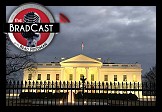 About Some of Trump's 'Day One' Threats: 'BradCast' 12/18/24
About Some of Trump's 'Day One' Threats: 'BradCast' 12/18/24 Trump Family Corruption Cometh...So Does Our Opposition: 'BradCast' 12/17/24
Trump Family Corruption Cometh...So Does Our Opposition: 'BradCast' 12/17/24 'Green News Report' 12/17/24
'Green News Report' 12/17/24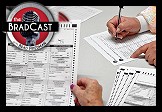 Mistallied Contests Found in OH County, as Oligarchy Rises in D.C.: 'BradCast' 12/16
Mistallied Contests Found in OH County, as Oligarchy Rises in D.C.: 'BradCast' 12/16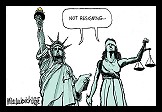 Sunday 'Barrel Bottom' Toons
Sunday 'Barrel Bottom' Toons Trump Admits He Can't Lower Grocery Prices (Biden Just Did): 'BradCast' 12/12/24
Trump Admits He Can't Lower Grocery Prices (Biden Just Did): 'BradCast' 12/12/24 'Green News Report' 12/12/24
'Green News Report' 12/12/24 What 'Unprecedented and Powerful Mandate'?: 'BradCast' 12/11/24
What 'Unprecedented and Powerful Mandate'?: 'BradCast' 12/11/24 Trump Barely Won Natl'y, But Won 'News Deserts' By Landslide: 'BradCast' 12/10/24
Trump Barely Won Natl'y, But Won 'News Deserts' By Landslide: 'BradCast' 12/10/24 Bad Weekend for Authoritarians; Also: Pardon or Not?: 'BradCast' 12/9/24
Bad Weekend for Authoritarians; Also: Pardon or Not?: 'BradCast' 12/9/24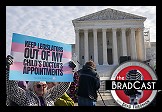 Fox 'News' and GOP Get Their Hateful War on Trans Kids at SCOTUS: 'BradCast' 12/5/24
Fox 'News' and GOP Get Their Hateful War on Trans Kids at SCOTUS: 'BradCast' 12/5/24 'Mind Boggles at Potential Corruption' in Trump Scheme: 'BradCast' 12/4/24
'Mind Boggles at Potential Corruption' in Trump Scheme: 'BradCast' 12/4/24 In Defense of Democracy from S. Korea to N. Carolina: 'BradCast' 12/3/24
In Defense of Democracy from S. Korea to N. Carolina: 'BradCast' 12/3/24 Hunter's Pardon: 'BradCast' 12/2/24
Hunter's Pardon: 'BradCast' 12/2/24 How (and Why!) to 'Extend Olive Branch' to MAGA Members: 'BradCast' 11/21/24
How (and Why!) to 'Extend Olive Branch' to MAGA Members: 'BradCast' 11/21/24
 VA GOP VOTER REG FRAUDSTER OFF HOOK
VA GOP VOTER REG FRAUDSTER OFF HOOK Criminal GOP Voter Registration Fraud Probe Expanding in VA
Criminal GOP Voter Registration Fraud Probe Expanding in VA DOJ PROBE SOUGHT AFTER VA ARREST
DOJ PROBE SOUGHT AFTER VA ARREST Arrest in VA: GOP Voter Reg Scandal Widens
Arrest in VA: GOP Voter Reg Scandal Widens ALL TOGETHER: ROVE, SPROUL, KOCHS, RNC
ALL TOGETHER: ROVE, SPROUL, KOCHS, RNC LATimes: RNC's 'Fired' Sproul Working for Repubs in 'as Many as 30 States'
LATimes: RNC's 'Fired' Sproul Working for Repubs in 'as Many as 30 States' 'Fired' Sproul Group 'Cloned', Still Working for Republicans in At Least 10 States
'Fired' Sproul Group 'Cloned', Still Working for Republicans in At Least 10 States FINALLY: FOX ON GOP REG FRAUD SCANDAL
FINALLY: FOX ON GOP REG FRAUD SCANDAL COLORADO FOLLOWS FLORIDA WITH GOP CRIMINAL INVESTIGATION
COLORADO FOLLOWS FLORIDA WITH GOP CRIMINAL INVESTIGATION CRIMINAL PROBE LAUNCHED INTO GOP VOTER REGISTRATION FRAUD SCANDAL IN FL
CRIMINAL PROBE LAUNCHED INTO GOP VOTER REGISTRATION FRAUD SCANDAL IN FL Brad Breaks PA Photo ID & GOP Registration Fraud Scandal News on Hartmann TV
Brad Breaks PA Photo ID & GOP Registration Fraud Scandal News on Hartmann TV  CAUGHT ON TAPE: COORDINATED NATIONWIDE GOP VOTER REG SCAM
CAUGHT ON TAPE: COORDINATED NATIONWIDE GOP VOTER REG SCAM CRIMINAL ELECTION FRAUD COMPLAINT FILED AGAINST GOP 'FRAUD' FIRM
CRIMINAL ELECTION FRAUD COMPLAINT FILED AGAINST GOP 'FRAUD' FIRM RICK SCOTT GETS ROLLED IN GOP REGISTRATION FRAUD SCANDAL
RICK SCOTT GETS ROLLED IN GOP REGISTRATION FRAUD SCANDAL VIDEO: Brad Breaks GOP Reg Fraud Scandal on Hartmann TV
VIDEO: Brad Breaks GOP Reg Fraud Scandal on Hartmann TV RNC FIRES NATIONAL VOTER REGISTRATION FIRM FOR FRAUD
RNC FIRES NATIONAL VOTER REGISTRATION FIRM FOR FRAUD EXCLUSIVE: Intvw w/ FL Official Who First Discovered GOP Reg Fraud
EXCLUSIVE: Intvw w/ FL Official Who First Discovered GOP Reg Fraud GOP REGISTRATION FRAUD FOUND IN FL
GOP REGISTRATION FRAUD FOUND IN FL



















 The death spiral for the 131 year-old company, once respectfully known as Diebold, continues, as its stock price falls to a 5-year low today, near year's end (currently $29.23/share and still sinking, from a 52-week high of $54.50/share), along with
The death spiral for the 131 year-old company, once respectfully known as Diebold, continues, as its stock price falls to a 5-year low today, near year's end (currently $29.23/share and still sinking, from a 52-week high of $54.50/share), along with  Since then, following one independent
Since then, following one independent  Republicans in the Senate are refusing to allow an up-or-down vote on nominations to the FEC, which means that at the end of the year when the terms of four current appointees end --- including previously recess-appointed GOP "vote fraud" zealot Hans von Spakovsy --- there will not be enough commissioners to even hold a vote. An interesting, if troubling, notion for a Presidential Election year.
Republicans in the Senate are refusing to allow an up-or-down vote on nominations to the FEC, which means that at the end of the year when the terms of four current appointees end --- including previously recess-appointed GOP "vote fraud" zealot Hans von Spakovsy --- there will not be enough commissioners to even hold a vote. An interesting, if troubling, notion for a Presidential Election year. RELATED: Speaking of which, our DoJ Voting Rights section sources tell us John
RELATED: Speaking of which, our DoJ Voting Rights section sources tell us John 
 Newly
Newly  Guest Blogged by John Gideon of
Guest Blogged by John Gideon of 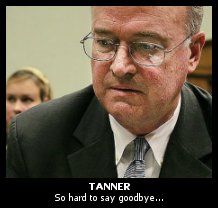 It looks like the now-
It looks like the now- Guest Blogged by
Guest Blogged by  After consecutive Coulter controversies and embarrassments at the Conservative Political Action Conference (CPAC)
After consecutive Coulter controversies and embarrassments at the Conservative Political Action Conference (CPAC)  Colorado's Republican Secretary of State, Mike Coffman, has announced that a number of Colorado's e-voting machines have failed state certification testings, and will not be allowed for use in the 2008 election cycle. The announcements came at a news conference in Denver which completely just minutes ago.
Colorado's Republican Secretary of State, Mike Coffman, has announced that a number of Colorado's e-voting machines have failed state certification testings, and will not be allowed for use in the 2008 election cycle. The announcements came at a news conference in Denver which completely just minutes ago. In an irony of ironies, the man famous for fabricating --and then
In an irony of ironies, the man famous for fabricating --and then 














